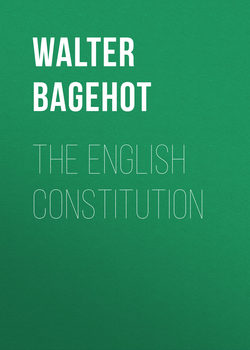The English Constitution

Реклама. ООО «ЛитРес», ИНН: 7719571260.
Оглавление
Walter Bagehot. The English Constitution
NO. I. INTRODUCTION TO THE SECOND EDITION
NO. II. THE CABINET
NO. III. THE MONARCHY
NO. IV. THE HOUSE OF LORDS
NO. V. THE HOUSE OF COMMONS
NO. VI. ON CHANGES OF MINISTRY
NO. VII. ITS SUPPOSED CHECKS AND BALANCES
NO. VIII. THE PREREQUISITES OF CABINET GOVERNMENT, AND THE PECULIAR FORM WHICH THEY HAVE ASSUMED IN ENGLAND
NO. IX. ITS HISTORY, AND THE EFFECTS OF THAT HISTORY.—CONCLUSION
Отрывок из книги
"On all great subjects," says Mr. Mill, "much remains to be said," and of none is this more true than of the English Constitution. The literature which has accumulated upon it is huge. But an observer who looks at the living reality will wonder at the contrast to the paper description. He will see in the life much which is not in the books; and he will not find in the rough practice many refinements of the literary theory.
It was natural—perhaps inevitable—that such an under growth of irrelevant ideas should gather round the British Constitution. Language is the tradition of nations; each generation describes what it sees, but it uses words transmitted from the past. When a great entity like the British Constitution has continued in connected outward sameness, but hidden inner change, for many ages, every generation inherits a series of inapt words—of maxims once true, but of which the truth is ceasing or has ceased. As a man's family go on muttering in his maturity incorrect phrases derived from a just observation of his early youth, so, in the full activity of an historical constitution, its subjects repeat phrases true in the time of their fathers, and inculcated by those fathers, but now true no longer. Or, if I may say so, an ancient and ever-altering constitution is like an old man who still wears with attached fondness clothes in the fashion of his youth: what you see of him is the same; what you do not see is wholly altered.
.....
There is another reason which, in an old constitution like that of England, is hardly less important. The most intellectual of men are moved quite as much by the circumstances which they are used to as by their own will. The active voluntary part of a man is very small, and if it were not economised by a sleepy kind of habit, its results would be null. We could not do every day out of our own heads all we have to do. We should accomplish nothing, for all our energies would be frittered away in minor attempts at petty improvement. One man, too, would go off from the known track in one direction, and one in another; so that when a crisis came requiring massed combination, no two men would be near enough to act together. It is the dull traditional habit of mankind that guides most men's actions, and is the steady frame in which each new artist must set the picture that he paints. And all this traditional part of human nature is, ex vi termini, most easily impressed and acted on by that which is handed down. Other things being equal, yesterday's institutions are by far the best for to-day; they are the most ready, the most influential, the most easy to get obeyed, the most likely to retain the reverence which they alone inherit, and which every other must win. The most imposing institutions of mankind are the oldest; and yet so changing is the world, so fluctuating are its needs, so apt to lose inward force, though retaining out ward strength, are its best instruments, that we must not expect the oldest institutions to be now the most efficient. We must expect what is venerable to acquire influence because of its inherent dignity; but we must not expect it to use that influence so well as new creations apt for the modern world, instinct with its spirit, and fitting closely to its life.
The brief description of the characteristic merit of the English Constitution is, that its dignified parts are very complicated and somewhat imposing, very old and rather venerable; while its efficient part, at least when in great and critical action, is decidedly simple and rather modern. We have made, or rather stumbled on, a constitution which—though full of every species of incidental defect, though of the worst workmanship in all out-of-the-way matters of any constitution in the world—yet has two capital merits: it contains a simple efficient part which, on occasion, and when wanted, can work more simply and easily, and better, than any instrument of government that has yet been tried; and it contains likewise historical, complex, august, theatrical parts, which it has inherited from a long past—which take the multitude—which guide by an insensible but an omnipotent influence the associations of its subjects. Its essence is strong with the strength of modern simplicity; its exterior is august with the Gothic grandeur of a more imposing age. Its simple essence may, mutatis mutandis, be transplanted to many very various countries, but its august outside—what most men think it is—is narrowly confined to nations with an analogous history and similar political materials.
.....